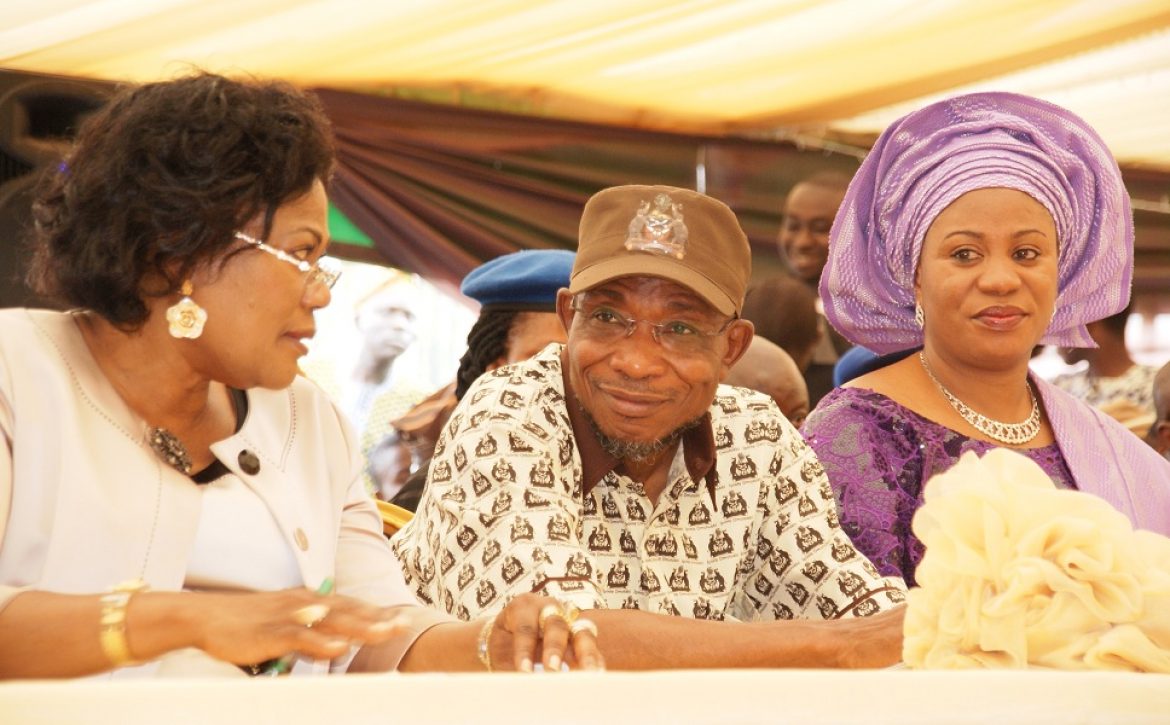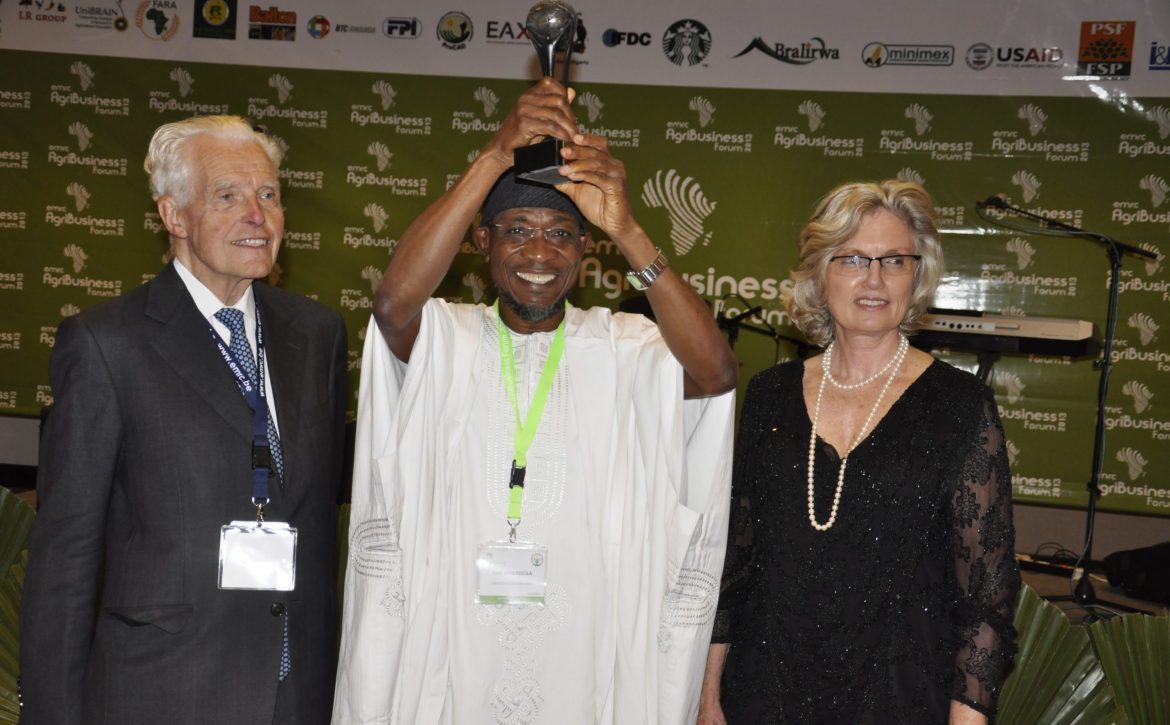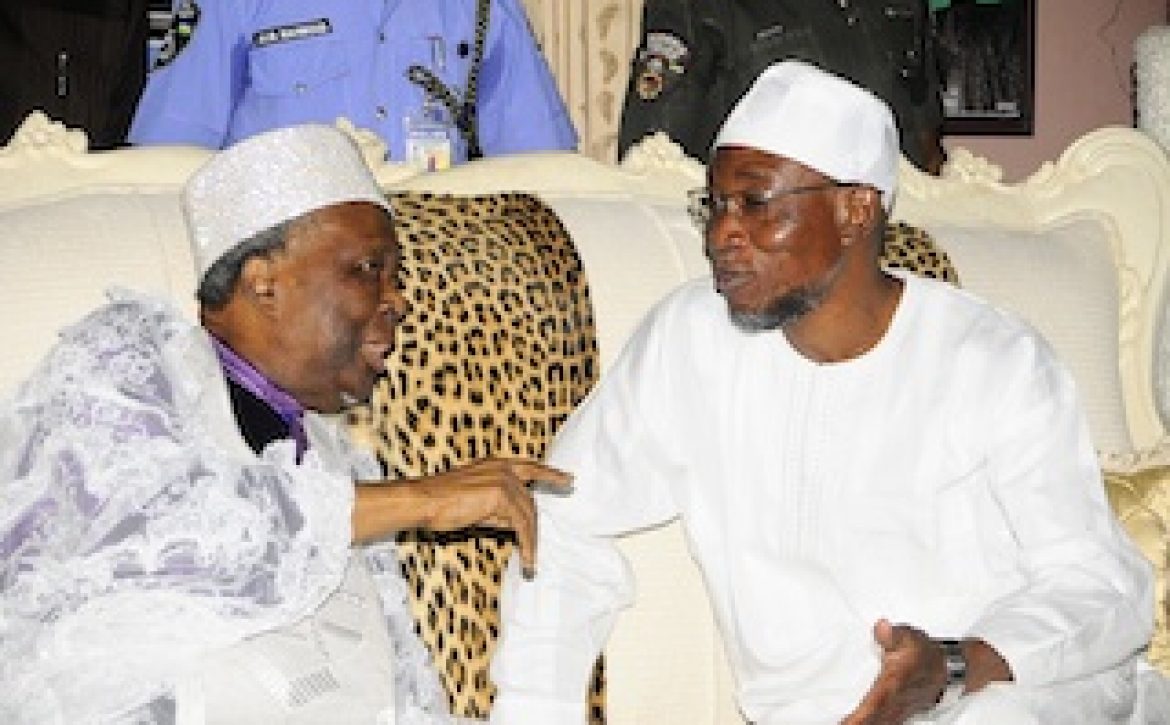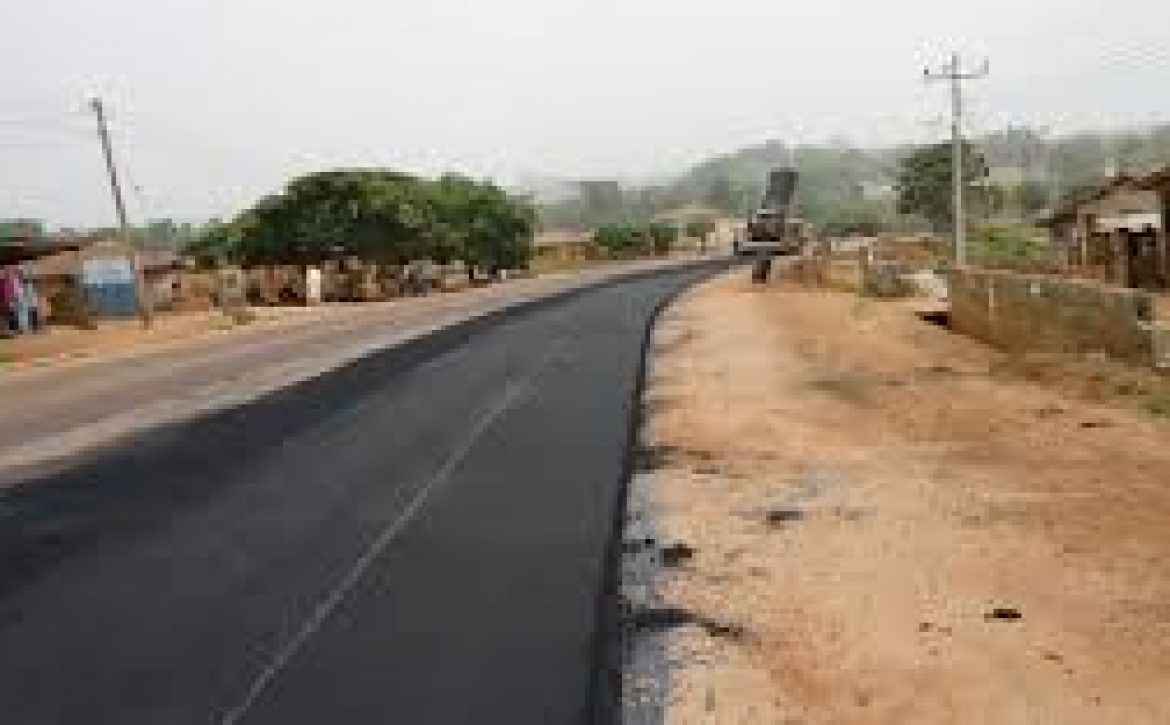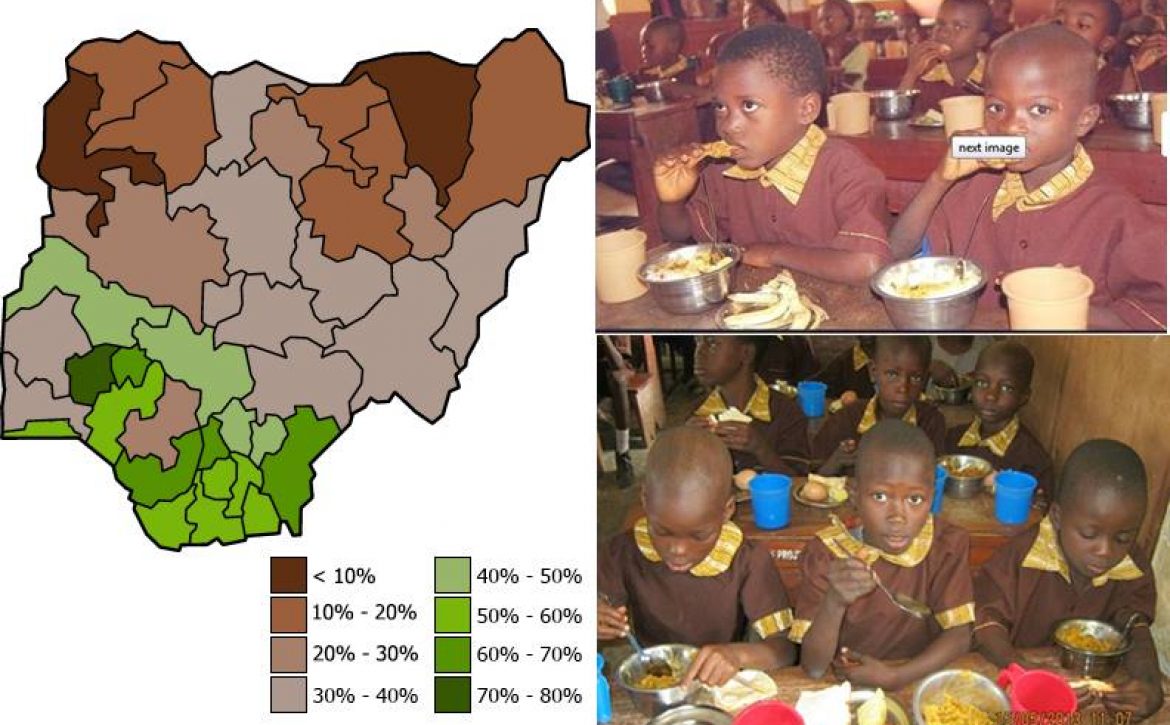BusinessDay States’ Good Governance and Competitiveness Awards ceremony earlier scheduled to hold this month has been shifted to November 2 this year.
The awards aim to deepen peer review mechanism and inspire competitiveness among the states of the federation as well as reward hardworking governors whose efforts at developing their states are contributing to the growth of the national economy.
BusinessDay Research and Intelligence Unit (BRIU) will also be presenting its economic report on states at the dinner. The awards are a product of extensive tour of states across the country by BusinessDay editorial and research team.
The shift in date was necessitated by the Eid-el-Kabir celebration and the Christian pilgrimage. The awards ceremony will now hold on November 2 in Lagos.
BusinessDay Award Committee for the 2013 State Competitiveness and Good Governance Awards had in September released the names of state governments that met the minimum criteria for each of the award categories.
The 12 award categories are Excellence in Governance, Transparency in Governance, Best Governor in Urban and Rural Infrastructure Development, Best Governor in Education Development, Best Governor in Healthcare Development, and Best Governor in Agriculture Development.
Others are Best Governor in Tourism Development, Fastest Growing State Economy, Best Governor in Housing Development, the State with the Best Ease of Doing Business, Youth and Sport Development, and the State with the Most Improved Security.
An average of four state governments will compete under each award category.
The nominees for Excellence in Governance award are Akwa Ibom, Edo, Kano, Lagos, Osun and Rivers States. This award category aims to celebrate the state with the highest standards in governance.
For Transparency in Governance award, Anambra, Ebonyi, Edo, Ekiti, Jigawa, Kano, Lagos, Niger and Osun made it to the final round. Transparency in Governance award is meant to show the state government that is most accountable to its subjects.
Imo, Oyo, Akwa Ibom, Anambra, Edo, Kano, Lagos, Osun, Oyo and Rivers State governors were nominated for the Best Governor in Urban and Rural Infrastructure Development award. Similarly, Akwa Ibom, Edo, Ekiti, Gombe, Imo, Kano, Ogun, Osun, Oyo and Rivers were nominated for the Best Governor in Education Development award category.
The award committee listed Abia, Akwa Ibom, Anambra, Ebonyi, Lagos, Niger, Ondo and Osun States as those that will compete for the Best Governor in Healthcare Development award category.
For the best Governor in Agriculture Development, Abia, Adamawa, Bauchi, Benue, Cross River, Kano, Kwara, Niger and Ogun States were nominated.
Four states each will compete for the Best Governor in Tourism Development and Youth and Sport Development awards. They are Kebbi, Cross River, Ekiti and Osun States, and Delta, Cross River, Lagos and Rivers, respectively.
Lagos, Ogun, Ondo, Osun and Rivers States were nominated for Fastest Growing State Economy award category. Similarly, Enugu, Kano, Abia, Akwa Ibom and Cross River will vie for the Best Governor in Housing Development award.
Enugu, Gombe, Jigawa, Kebbi, Kogi, Kwara and Yobe were nominated for the Best State with Ease of Doing Business award. In the same manner, Abia, Cross River and Rivers States were nominated for the State with the Most Improved Security award.
BUSINESS DAY
Residents and indigenes of the State of Osun have continued to witness innovations and changes in all sectors of the state especially education. Some of these changes have direct impact on the pupils, teachers, Parent/Teacher Associations, educational institutions, stakeholders and the entire residents of the state.
To teachers, former school owners and others, some of these changes had appeared not too palatable as there were some complaints put across to the government which it is trying to fix to the satisfaction of all. Some of the complaints especially from the former school owners were problem of identity; retention of names that schools bear as well as single-sex schools across the state.
At the beginning of the 2013/2014 academic session which commenced on Wednesday 2nd October 2013, the former school owners at Baptist Girls High School, Osogbo, Saint Charles Grammar School (boys only) and some others resisted the merging of male students from Fakunle Comprehensive High School and female from other schools into Saint Charles Grammar School.
The State Deputy Governor, Mrs. Grace Titilayo Laoye-Tomori who doubles as State Commissioner for Education however rose to the occasion by visiting the affected schools to address the situation and douse the tension.
The re-classifications of schools in the state, government sources revealed, was meant to bring pupils of the same age brackets together in classes and provide necessary tools and teaching aid required for different categories of pupils/students.
The new system would put an end to multiplicity and duplicity of schools which had resulted in decay in school infrastructures in addition to dislocating school system but would create conducive environment for teaching and learning.
It was gathered that some of the positive changes, so far witnessed in the state’s education sector include provision of free school uniform to about 750,000 students in public schools in the state, increase in examination and running grants to schools, reduction of school fees in state owned tertiary institutions including Osun State University, provision of adequate instructional materials, school feeding programme to pupils in primary one to four among others.
To some school of thought, the changes are unique especially the distribution of e-learning device computer tablet otherwise called “Opon Imon”, to all students in senior secondary schools across the state, re-building and construction of new modern classrooms and new educational system of 4-5-3 policy encompassing the re-classification of primary and secondary education into Elementary, Middle and High Schools; the sample of the middle school (Salvation Army Middle School, Alekunwodo, Osogbo) which was commissioned on Wednesday October 2, 2013 by Governor Rauf Aregbesola.
The commissioning of this school marked the flag-off of the new school system (re-classification) which had been in the drawing board for more than a year. Under this new school system; the state is targeting building 100 Elementary Schools, 50 Middle Schools and 20 High Schools as first phase. High School will be having facilities such as boarding, staff quarters, standard laboratories, food courts, standard sporting facilities, school hall of 1000 minimum sitting capacity and school managers for proper facility management.
The elementary school will comprise pupils from ages 6 to 9 years or primary 1-4 with maximum capacity of 900 pupils in cities and lesser population in rural communities. The school daily activities run between the hours of 8am and close by 2pm. The schedule is believed to have been put together for effective implementation of school feeding programme called ‘O Meal’.
Pupils in Middle School range between the ages of 10 and 14years or preferably Primary 5 to Junior Secondary School (JSS 3) with enrolment capacity between 900 and 1,000 and their daily school activities will run between 8am and 3pm.
Those in High School are between the ages of 15 and 17years or rather Senior Secondary School (SSS1 to SSS3) with enrolment capacity of 3,000. Their daily activities run between the hours of 8am and 5pm. Here, the pupils would be provided with e-learning device called “Opon Imon” with government responsible for the payment of WASC fees.
While performing the commissioning of the Salvation Army Middle School, Alekunwodo, Osogbo which was used as pilot scheme of modern school buildings being constructed by the current administration, Aregbesola brought himself down to the level of the pupils by dressing in school uniform for the middle school.
Immediately Governor Aregbesola stormed the venue of the commissioning in school uniform, large crowd of people moved in his direction to have glimpse of his appearance. The pupils hailed his attire and he waved consistently to the admiration of the pupils, parents and school teachers and head teachers.
There were excitements on the part of the parents, pupils and teachers at the occasion even as local drummers and musician invited for the occasion added glamour to the event with some political songs.
In her welcome address, Mrs. Laoye-Tomori, pointed out that the school has proved the skeptics wrong. She said though it did not come cheap, adding that the building which she described as one of the many to be commissioned, represents the crowning glory of the Aregbesola revolutionary agenda in the education sector.
Laoye-Tomori said; “I feel like ‘break dancing’, even at my age. The joy excitement, sense of fulfillment all rolled into one. I specifically thank God that I am alive to see the coming to fruition of a vision seen, conceptualized, and deployed by my indefatigable governor, Ogbeni Aregbesola.
“When Governor Aregbesola made the promise to transform the education sector, many people as usual, thought it was a mere campaign sloganeering. The education transformation agenda of the present administration is the holistic type; the government meant a systemic overhaul.
“The daily feeding of pupils in the public elementary schools across the state (with its economic multiplier effects and the empowerment of over 3000 women appointed by the state as Food Vendors) is one of the critical steps taken by this administration to address the forlorn decay that we met in the education sector when we assumed office.
“In addition, provision of school uniforms for all pupils and students in the public schools in the state, provision of adequate financial support to public schools as grants, running costs, and examination fees. The introduction of training schemes, promotion of teachers, and prompt payment of teachers’ salaries helped in no small way to stem the high turnover of skilled teachers.
“The contractor has put conservative cost of this beautiful edifice at about N165million. The skeletal structure of the building alone cost about N90m, while external work, reclaiming the school property (compensations inclusive), and overcoming the challenge of erosion gulped over N50m. Furniture and fittings, other esthetics cost about N25m. Now that the building is commissioned today, we will have accurate cost figure of the school. Suffice to say, that whatever the total cost come up to, my Governor is committed to funding the advancement of education up to the standard acceptable to us.
“For the records, our administration embarked on the re-classification exercise for the following objective reasons: – first, the hitherto poor performance of students in both internal and external examinations necessitated the need by Government to introduce the new school system and re-classification which is believed would help to revamp the rot in the education sector and bring back its lost glory”.
According to her, with the new arrangement, government will be able to provide necessary tools and teaching aids required for different categories of pupils. It will also make inspection and supervision of schools easy and effective.
The new school system, she said, aims at removing financial burden of running of schools totally from parents and saddles the government wholly with the responsibility of school infrastructural development, funding and management. It is, according to her, designed to make access to quality education available to all children of Osun without any discrimination, thereby giving a level playing ground to all of our students.
While speaking, Aregbesola said that the commissioning of the pilot scheme was a resounding re-affirmation that state education policy is a train engineered for a one-way trip to success.
The governor remarked that the trip began with the Education Summit convened when he assumed office, noting that the Summit was summoned against the background of the decay the administration met in public schools, which it found simply unacceptable.
In his words; “The Summit was summoned against the background of the decay we met in Osun public schools, which we found simply unacceptable. The Summit, composed of eminent Nigerians like the Nobel Laureate, Professor Wole Soyinka, came up with a reform blueprint to overhaul public sector education in the state.
“We have since been working assiduously to implement the reform plan. The commissioning of this school is good evidence that all is going to plan with our reform. As part of the reform, we decided to re-organise the school system into Elementary, Middle and High school categories.
“The overall aim of the reforms we are carrying out is to develop the new man intellectually, socially and morally. This new man is placed in the centre of society who views his own development as part of and for the development of society
Aregbesola therefore appealed to parents to support the government in its efforts by preparing their wards for the new system and especially kit them with the new uniform, saying the gains are already tumbling in as the state is witnessing progressive improvement in the academic performances of the pupils.
He noted that beside distribution of Opon Imo and the school feeding programme, the economic ramification of the education reform is simply colossal.
“Some 3,000 women have been employed for the Elementary feeding programme; this is in addition to the gains it has brought to the production capacities of farmer-suppliers of farm produce, as well as the poultry and beef input for the food menu”, the governor added.
He also reminded his audience to recall the depressing outlooks of the former schools which he said were never fit for learning, adding that the transformation of the schools is another illustration of the massive transformation taking place in all aspects of the lives of the Osun people.
The Vice-Chairman, Senate Committee on Education, Professor Sola Adeyeye representing Osun Central in National Assembly said in his comment that any nation that did not invest in the education of its youths would fail.
Adeyeye, Professor of Molecular Biology lauded the governor’s commitment in revamping education, adding that while many states have not accessed the UBEC funds because they could not contribute their counterpart fund, Osun had accessed it because it did not wait for the Federal Government to contribute its counterpart fund.
The State Chairman of Nigeria Labour Congress (NLC), Alhaji Saka Adesiyan while describing the gesture as unique, noted that the state is gradually wearing new look owing to developmental projects going on across the state.
The Chairman, Osun School Infrastructural Development Committee tagged “O School”, Otunba Lai Oyeduntan noted that the state of education in the state was embarrassing before Aregbesola assumed office. He hinted that by the end of the year, 15 Middle, 13 Elementary and 10 High schools would be ready for use of the pupils.
The Speaker, State House of Assembly, Hon. Nojeem Salam in his comment said the administration’s policies had revived the education sector.
Though the re-classification of public schools in the state is generating some complaints from some section of the people of the state particularly the former owners and teaching staff in the service of the state government, the state government has promised to look into some genuine claims by the individuals and groups in line of the new policy to make necessary adjustment in the interest of the generality of people.
Laoye-Tomori while justifying the new system insisted that it is not in conflict with the National Policy on Education or the National School Curriculum.
She said; “under the re-classification, we run the National 6-3-3-4 System as well as the normal school academic calendar under the re-classification of the primary and secondary education into elementary, middle and high schools. What we have done is to put pupils in primaries 1-4 under the same roof and environment with provision of modern facilities that is consistent with their age. Here, they spend the first four years of the six years of the 6-3-3-4 system.
“The middle school has pupils of primary 5 and 6 put together under same roof and environment with students of JJS1-3. The pupils of primary 5 and 6 complete the last two years of the six years of their primary education, write their terminal examination and continue with the next segment of three years of the 6-3-3-4 system.
The high school is also designed and purpose-built for students that have completed their middle school to spend the last three years of the basic education in the 6-3-3-4 system.
Remarkably, the State Chapter of All Progressives Congress (APC) has lauded the government for the milestone it had taken in repositioning the educational system. The party in a statement issued and signed by its Director of Publicity and Strategy, Kunle Oyatomi said that the new system climax the series of actions taken since the administration of the Aregbesola to reposition the educational system in the State.
The party noted that citizens of the state are lucky to have the person of Aregbesola at this point in time who has demonstrated passion for education as the basis not only for human capital development but also for the general enlightenment of the people of Osun.
DAILY INDEPENDENT
 Mr. Lawrence Oyeniran, the Permanent Secretary, Osun Ministry of Education, has advised heads of public and private schools in the state to comply strictly with curriculum and guidelines.
Mr. Lawrence Oyeniran, the Permanent Secretary, Osun Ministry of Education, has advised heads of public and private schools in the state to comply strictly with curriculum and guidelines.
Oyeniran gave the advice while presiding over the 2013 West African Examinations Council (WAEC) Committee meeting in Osogbo.
He said government saw the monitoring of schools, teachers and learning facilities a priority.
“This is why the Teaching Service Commission, formerly known as TESCOM, was decentralised into three education districts with the appointment of Tutor-General as Permanent Secretary to oversee the districts.
“The essence of the yearly WAEC committee meeting is to appraise WAEC activities with a view to improve students’ performance in the state.
“Government’s policy of re-classification of schools is in conformity with the national curriculum, aimed at removing the rot in the education sector,’’ Oyeniran said.
He appealed to the branch controller of WAEC in the state, Mr. Ayo Oluwafemi, to release the statistics of students’ performance.
Oyeniran said the analysis was to enable government to reward the best 10 students in the year 2013 WAEC examination.
Briefing the meeting, Mr. Kafaru Babatunde-Ola, the Zonal Co-ordinator of WAEC, said the council would not compromise its long-standing record of zero tolerance for corruption.
Babatunde-Ola disclosed that from the year 2014, any student caught with mobile phone during examinations would have his or her entire results cancelled.
He urged the Ministry of Education to officially issue a circular that would prohibit the use of mobile phones by students in examination halls.
Babatunde-Ola urged the ministry to also embark on public enlightenment programmes for students and parents.
“The fight against examination malpractices goes beyond individuals, but a collective responsibility of all stakeholders in the education sector,’’ he said.
The meeting had in attendance representatives from the Nigeria Union of Teachers, Federal Ministry of Education, the state Civil Service Commission, Conference of Principals and Parents Teachers Association (PTA).
THE NIGERIAN OBSERVER
Photos from Rwanda where the Governor of the State of Osun shone bright, winning the award for agriculture innovation

The education policies of Governor Rauf Aregbesola of Osun State has been described as a reminiscence of the education reforms of the late sage, Chief Obafemi Awolowo, during the First Republic.
The Ooni of Ife, Oba Okunade Sijuwade, made the observations at the public assessment forum tagged Gbangba Dekun in Ile-Ife.
A question and answer session, Gbangba Dekun is a platform provided by government for people to meet their leaders and office holders to openly assess the performance of the government on its programmes and policies.
Ooni, who was represented at the gathering by Obalufe of Iremoland, Chief Folorunsho Omishakin, said one striking resemblance between Awolowo’s education reform and Aregbesola’s current education reform is that both were antagonised.
According to the monarch, in 1955 when Awolowo started his education reforms in the then Western Region, people antagonised him but the late sage remained undaunted in his commitment to turning around the region’s education fortune.
Ooni said Awolowo’s reform succeeded at last because of late politician’s tenacity of purpose and selfless conviction for the future of the region.
He added that but for the focus and determination Awolowo had, he would have chickened out of the programme and the entire South -west region would have been the worst for it.
He lamented that a few people had failed to see beyond the immediate to see the overall benefit of the school reform process blaming those antagonizing the plans as mixing pure development issues in the education sector with politics and religion.
He commended the bold step of the governor in tackling the rot in this all-important sector, advising him not to be distracted by what some people are doing or saying about the reforms.
“Your programme too will succeed like that of Obafemi Awolowo. When Awolowo started the reform, people antagonised him. They said the programme would not succeed.
But before our very eyes, Awo’s education programme succeeded. We still can see many of the products of that reform till today. “If other regions had followed what he did in education sector in the then Western region, may be today there won’t be Boko Haram up North or militants in the Niger Delta. Or at worst, what we would have today are educated militants and Boko Haram members.
“So, like Awo, don’t be discouraged by antagonisms and criticisms of few people. Remain focused on your reform programme and you will succeed,” Ooni said.
He advised government on accountability through effective monitoring by school inspectors, attributing the collapse of previous education system to the sudden disappearance of old school inspectorate system.
Commending the governor’s sterling performance in the last three years, the first class monarch said an upright man would come to the fore for public assessment without fear, which is why Aregbesola organises such public, meet-your-leader forum for an assessment of his government’s performance in the open.
In his response, Aregbesola commended the people of the state for their unflinching supports for all his administration’s programmes.
THISDAY

The Igbimo Agba (Elders Council) of the All Progressives Congress (APC) in the State of Osun has charged the Federal Government and the Federal Roads Maintenance Agency (FERMA) to end their non-challant attitude to the deplorable condition of federal roads in the state.
Rising from its meeting held in Ilobu, State of Osun at the weekend at the end of which the council issued a communiqué, the APC elders decried the neglect of virtually all federal roads on Osun especially the Osogbo-Ilobu-Ifon-Ogbomoso road.
According to the communiqué signed by the Osun APC Elders Council chairman, Engineer (Chief) Sola Akinwumi, they noted that the road was “the shortest major link between the States of Osun, Oyo and indeed, Kwara” that are useful for commuters as the Ileya and Christmas festivities approach.
While commending the laudable development programmes of Governor Rauf Aregbesola to uplift the state’s infrastructure, the elders expressed their displeasure at the neglect of federal roads and called on “the FERMA and the office of the Federal Controller of Works in the State of Osun to be alive to their responsibilities”.
After carrying out a review of various programmes and policies of the state government, the meeting unanimously lauded the “enviable achievements of Governor Rauf Aregbesola especially on the spread, quantum and quality of road infrastructure throughout the state”.
The Igbimo Agba council specifically expressed approval of the performance of the contractor handling the construction of Oba Adesoji Aderemi Ring Road, Chief Bisi Akande Trumpet Bridge on the Freedom Way, Gbongan-Akoda Road, Old Garage-Ikirun-Ila-Odo road and called for their speedy and timely completion.
However, the APC elders frowned at the slow pace of work being handled by contractors handling the 10-kilometre per Local Government roads which performance they noted, have not been impressive enough.
On education, the council commended Aregbesola for his commitment to the provision of functional education in the state particularly the introduction of the award winning Opon-Imo tablet which they described as unique and the first of its kind globally at the last United Nations’ World Summit Award.
While congratulating Governor Aregbesola for being a listening and visionary leader over his administration’s policy of schools re-classification, the APC elders advised teachers, pupils and parents to make good use of the new educational infrastructural facilities as the new academic session begins in the State of Osun.

According to a recent report by the National Bureau of Statistics , State of Osun now ranks highest in public primary school enrollment in the country. This report puts Osun’s children enrollment in primary school between 70 and 80 per cent, no other state in the country falls within Osun’s category while Ekiti, Delta, Cross River, Enugu states rank between 60 and 70 per cent. This is a feat made possible by Ogbeni Aregbesola’s patriotic struggle to effect a sustainable change in the educational structure of the state and with all these laudable efforts Osun will surely become the state with highest literacy level in Nigeria in the near future.
At the moment, the public schools in the state can boast of a student population of over 750,000 with virtually all parental responsibilities taken over by the Government . A general public opinion on the ongoing re-classification exercise clearly indicates that the acceptability of the new school reforms by all major stakeholder is about 90% inspite of some low level of resistance from a very little segment of the Christian body and of course the state opposition party who never wished the state well .
People of the state who sincerely and genuinely irrespective of their status want a complete revamping of the educational sector are fully in support of the policy and have continued rooting for this change.
I think it necessary i take us down memory lane a bit , before the advent of the Aregbesola’s administration, it was practically impossible for students of public schools to have matriculable results for university admission . In 2010, only three percent of candidates from the State of Osun who sat for the West African Examination Council examination scored five credits, including English language and mathematics but following the vigorous intervention of the Government within the last 34 months, there has been marked improved performance of students in external examinations, especially WASCE where Osun students have consistently moved from 34th position in 2010, to 18th position in 2011 and 8th in 2012. Osun students have also recorded improved performances in National and International competitions as compiled recently by the Ministry of Education for the State Competitiveness awards.
I challenge our various online activists and Osun CAN to tell us a state that can match the great achievements of the State of Osun in the area of education in the last 34 months and for the benefit of doubt some of the notable achievements are listed below:
– The O School intervention for infrastructural upgrade and construction of 170 model schools complete with furniture and state of art facilities.
– The O Meal program for provision of one meal a day for pupils of Elementary schools and linkages with O’REAP and Commerce.
– The free Uniform and Omoluabi Garment Factory PPP initiatives; the UNESCO endorsement and promise of support.
– The computer Tablet, Opon Imo for students of High schools
– The Human capacity development through Recruitment of 6000 teachers,training, retraining and incentives to teachers; promotion, prompt payment of salaries and allowances.
– The payment of increased Running and Examination Grants to public schools. Primary School Basic Funding Grant increased from ₦7.4m per year to ₦424m per year . Primary school running grant before this administration was N1000 monthly per school for the 1378 schools in the state. The current administration increased running cost grant to N300 per child per term for the 357,533 school pupils in the state. Exam grant was also introduced at N100 per child per term.
– Improved supply of Instructional materials to schools
– Resuscitation of Co-curricular activities in schools; O Calisthenics, educational competitions and PE.
– Almost 50% Downward review of school fees in tertiary institutions, non-discriminatory fees regime and payment of subvention.
– Upward review of Bursary and Scholarships
– Promotion of Vocational and Technical Education
– Payment of External Examination fees of final year students in public schools.
– Sponsorship of over 100 stagnated UNIOSUN Medical students to Ukraine
and lot more !
Under the first phase of the new school reforms , the Government is committed to building 100 Elementary Model schools, 50 Middle Model schools and 20 High Model schools across the state. 27 out the 170 New Model schools with state of the art facilities promised will be commissioned in the following months in spite of the state’s merged resources. This is unprecedented in the 100 years of Nigeria.
“Any revolutionary programme often meets with violent opposition from those who does not want it to succeed” – Obafemi Awolowo. This was said when he first introduced free education in 1955, he went on to say “…we even had to quell riots engineered by political opponents who did not want us to succeed”
Aregbesola might be vilified for his principled position, but you cant fault the altruistic and patriotic motivation for his actions which will no doubt take Osun to its promise land.
Omowaiye Oluremi via Facebook
Thousands of holiday makers traveling to Osun, Kwara, Kogi and some other parts of the country have besieged the Iddo Terminus of the Nigerian Railway Corporation as the free Eid-il-kabir festival free train ride provided by the government of Osun entered its second day in Lagos.
The free train ride initiative of the Government of the State of Osun has once more commenced to commute people coming home for the Eid-il Kabir festival with indigenes of neighbouring states also taking advantage to get to their various destinations as they get to Osun capital, Osogbo which reduces their traveling expenses.
A statement signed by the Commissioner of Commerce, Cooperatives and Empowerment, Mr. Ismail Adekunle Jayeoba-Alagbada, said the train ride is to facilitate stress-free travelling for the people, who are coming home for the festival.
The free train ride, which spans five days, commenced on Saturday 12, 2013. For the journey to Osogbo, the train would take off from Iddo Terminus, Lagos at 11 o’clock daily on Saturday, 12th, Sunday, 13th and Monday 14th.
The return trip to Lagos, according to the statement, is fixed for Thursday 17th and Saturday 19th as the train would depart Osogbo at 11 o’clock daily.
Jayeoba-Alagbada said, government embarked on this transport initiate in the past three years so as to reduce stress people go through during these all-important festivals, adding that this is why during Easter, Eid –il Fitri, Eid –il Kabir and Christmas festivals, government introduce the free train ride.
“As we all know, this initiative has been on for the past three years. The primary aim of introducing it is to ease travelling experience of the people as well as encourage them to visit their state during festivity.
“The option is train ride is well thought of by the Rauf Aregbesola Administration so as to take pressure of the ever-busy roads within the South-West during this period and reduce the traffic volumes which normally causes gridlock on our roads.
“We hope our people, wherever they are coming from, Oyo, Ogun or Lagos, would make maximum use of this gesture of the government and promptly too. This is a sign that government has the welfare interests of the people at heart and would not detract from providing same as and when required,” Jayeoba-Alagbada said.
A passenger, Mrs. Idiat Oladosu, who claimed to be on her way to Oro, in Kwara State, said it was a good opportunity for her to reduce her cost of travelling.
Alhaji Ganiyu Alimi, who claimed to be an indigene of Inisa in Odo Otin Local Government Area of the state, said he had been enjoying the free train ride since the Aregbesolas’ administration introduced.
Mr. Awololo Samson, who said though he is not a Muslim coming for any festival, said he joined the train in Lagos to arrive in Osogbo on his way to Lokoja as he believed that would reduce his cost of travelling.
 The education policies of Governor of the State of Osun, Ogbeni Rauf Aregbesola, has been described as being reminiscent of the education reforms of the late sage, Chief Obafemi Awolowo, during the First Republic.
The education policies of Governor of the State of Osun, Ogbeni Rauf Aregbesola, has been described as being reminiscent of the education reforms of the late sage, Chief Obafemi Awolowo, during the First Republic.
This was the observation of the Ooni of ife, Oba Okunade Sijuwade on Thursday at the public assessment forum tagged Gbangba Dekun in Ile-Ife.
A question and answer session, Gbangba Dekun is a platform provided by government for people to meet their leaders and office holders to openly assess the performance of the government on its programmes and policies.
Ooni, who was represented at the gathering by Obalufe of Iremoland, Chief Folorunsho Omishakin, said one striking resemblance between Awolowo’s education reform and Aregbesola’s current education reform is that both were antagonised.
According to the monarch, in 1955 when Awolowo started his education reforms in the then Western Region, people antagonised him but the late sage remained undaunted in his commitment to turning around the region’s education fortune.
Ooni said Awolowo’s reform succeeded at last because of late politician’s tenacity of purpose and selfless conviction for the future of the region.
He added that but for the focus and determination Awolowo had, he would have chickened out of the programme and the entire South West region would have been the worst for it.
He regretted that a few people had failed to see beyond the immediate to see the overall benefit of the school reform process blaming those antagonizing the plans as mixing pure development issues in the education sector with politics and religion.
He commended the bold step of the governor in tackling the rot in this all-important sector, advising him not to be distracted by what some people are doing or saying about the reforms.
“You programme too will succeed like that of Obafemi Awolowo. When Awolowo started the reform, people antagonised him. They said the programme would not succeed. But before our very eyes, Awo’s education programme succeeded. We still can see many of the products of that reform till today.
“If other regions had followed what he did in education sector in the then Western region, may be today there won’t be Boko Haram up North or militants in the Niger Delta. Or at worst, what we would have today are educated militants and Boko Haram members.
“So, like Awo, don’t be discouraged by antagonisms and criticisms of few people. Remain focused on your reform programme and you will succeed,” Ooni said.
He advised government on accountability through effective monitoring by school inspectors, attributing the collapse of previous education system to the sudden disappearance of old school inspectorate system.
Commending the governor’s sterling performance in the last three years, the first class monarch said an upright man would come to the fore for public assessment without fear, which is why Aregbesola organises such public, meet-your-leader forum for an assessment of his government’s performance in the open.
In his response, Aregbesola commended the people of the state for their unflinching supports for all his administration’s programmes.
He disclosed that there are school inspectors monitoring the schools’ activities on regular basis, but promised that more would be deployed for effective monitoring across the state.
The governor said his administration, since its inception, has prioritised education and agriculture so as for the nation to be advanced in knowledge and self-sustained in food production.
He called on the youths in the state to key-in into the agriculture programmes of government so as to tap from vast business opportunities available.
 Government of the State of Osun today completed processes of accessing a N11.4 billion SUKUK bond, thereby becoming the first state to benefit from the non-interest bond in the entire sub-Saharan Africa.
Government of the State of Osun today completed processes of accessing a N11.4 billion SUKUK bond, thereby becoming the first state to benefit from the non-interest bond in the entire sub-Saharan Africa.
The processes were completed with the handing over of statutory documents to directors of Osun Sukuk Company, after which the Board Meeting of the company was held.
Speaking at the epoch making event the state governor, Rauf Aregbesola disclosed that, rather than being a ploy to Islamise the state as being alleged in some quarters, SUKUK, according to him, provided other avenues of raising funds with favourable repayment terms, to finance government’s projects.
He added that SUKUK remains an instrument of development, adding that majority of investors in the bond are non-Muslims.
The state Commissioner for Finance, Budget and Economic Planning, Dr. Wale Bolorunduro also explained that the processes of accessing the bond was open and transparent, making the state to get over subscription of the bond from the expected N10 billion to N11.4 billion.
Bolorunduro further stressed that, the bond is presenting to the state the opportunity to attract foreign investment adding that the way the transaction was structured made it a success, despite the changes that took place in the money market and interbank exchange before the SUKUK.
CHANNELS NEWS


